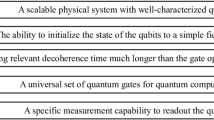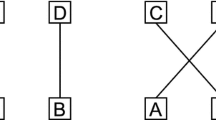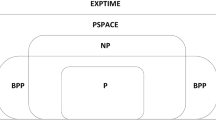Abstract
Does Nature permit the implementation of behaviours that cannot be simulated computationally? We consider the meaning of physical computation in some detail, and present arguments in favour of physical hypercomputation: for example, modern scientific method does not allow the specification of any experiment capable of refuting hypercomputation. We consider the implications of relativistic algorithms capable of solving the (Turing) Halting Problem. We also reject as a fallacy the argument that hypercomputation has no relevance because non-computable values are indistinguishable from sufficiently close computable approximations. In addition to considering the nature of computability relative to any given physical theory, we can consider the relationship between versions of computability corresponding to different models of physics. Deutsch and Penrose have argued on mathematical grounds that quantum computation and Turing computation have equivalent formal power. We suggest this equivalence is invalid when considered from the physical point of view, by highlighting a quantum computational behaviour that cannot meaningfully be considered feasible in the classical universe.
Similar content being viewed by others
References
Bains, S. and Johnson J.(2000), 'Noise, physics and non-Turing computation' in Joint Conference on Information Systems, Atlantic City, 28 February-March 3, 2000. http://citeseer.nj.nec.com/298231.html.
Benioff, P. (1980), 'The Computer as a Physical System: A Microscopic Quantum Mechanical Hamiltonian Model of Computers as Represented by Turing machines', Journal of Statistical Physics 22, pp. 563–591.
Bennett, C.H. (1993), 'Teleporting an Unknown Quantum State via Dual Classical and Einstein-Podolsky Rosen Channels', Physics Review Letters 70, pp. 1895–1898.
Bennett, C.H. (1995), 'Quantum Information and Computation', Physics Today 48(10), pp. 24–30.
Boden, M. A. (1988), Computer Models of Mind, Cambridge, UK: Cambridge University Press.
Church, A. (1940), 'On the Concept of a Random Sequence', Bulletin of the American Mathematical Society 46, pp. 130–135.
Churchland, P.M. (1988), Matter and Consciousness, Cambridge, MA, USA: MIT Press.
Copeland, A.H. (1940), '[Review of] Alonzo Church. On the Concept of a Random Sequence. Bulletin of the American Mathematical Society, vol. 46 (1940), pp. 130- 135', Journal of Symbolic Logic 5(2), pp. 71–72.
Copeland, B.J. (1997), 'The Church-Turing Thesis' in E. Zalta, ed., The Stanford Encyclopaedia of Philosophy. <http://plato.stanford.edu/ent ries/church-turing/>.
Copeland, B.J. (1998a), 'Super Turing-Machines', Complexity 4, pp. 30–32.
Copeland, B.J. (1998b), 'Even Turing Machines Can Compute Uncomputable Functions' in C. Calude et al., eds., Unconventional Models of Computation, London: Springer, pp. 150–164.
Copeland, B.J. (2000), 'Narrow versus Wide Mechanism: Including a Re-examination of Turing's Views on the Mind-Machine Issue', Journal of Philosophy 97(1), pp. 5–32.
Copeland, B.J. and Sylvan, R.(1999), 'Beyond the Universal Turing Machine', Australasian Journal of Philosophy 77, pp. 46–66.
Davies, E.B. (2001), 'Building Infinite Machines', British Journal for the Philosophy of Science 52(4), pp. 671–682.
Deutsch, D. (1985), 'Quantum Theory, the Church-Turing Principle and the Universal Quantum Computer', Proceedings of the Royal Society of London A 400, pp. 97–117.
Dornheim, C. (1998), 'Undecidability of Plane Polygonal Mereotopology' in A. G. Cohn et al., eds., Principles of Knowledge Representation and Reasoning, Proceedings of the Sixth International Conference (KR'98), Trento, Italy, pp. 342–353.
Earman, J. (1995), Bangs, Crunches, Whimpers, and Shrieks - Singularities and Acausalities in Relativistic Spacetimes, Oxford: Oxford University Press.
Earman, J. and Norton, J. (1993), 'Forever is a Day: Supertasks in Pitowsky and Malament-Hogarth Spacetimes', Philosophy of Science 5, pp. 22–42.
Feynman, R.P. (1986), 'Quantum Mechanical Computers', Foundations of Physics 16, pp. 507–531, reprinted from Optics News (February 1985), pp. 11- 20.
Feynman, R.P. et al., (1965), The Feynman Lectures on Physics (3 volumes). Reading, MA: Addison-Wesley, 1965.
Gödel, K. (1931), 'Ñber formal unentscheidbare Sätze der Principia Mathematica und verwandter Systeme I', Monatshefte für Mathematik und Physik 38, pp.173–198, published in English translation as (Meltzer, 1962).
Goodstein, R.L. (1964), Recursive Number Theory, being part of L. Brouwer et al., eds., Studies in Logic and the Foundations of Mathematics, Amsterdam: North-Holland.
Gowland, P and Lester, D. (2000), 'A Survey of Exact Computer Arithmetic' in Blanck, J. et al., eds., Proceedings of the Fourth Workshop on Computability and Complexity in Analysis (CCA2000), Swansea, Wales, Informatik Berichte 272–9/2000, FernUniversität, Fachbereit Informatik, Postfach 940, D-58084, Hagen, Germany, pp.99–115 [in English].
Hobson, E.W. (1923), The Domain of Natural Science, Cambridge, UK: Cambridge University Press, reissued as Hobson, E. W. (1968), The Domain of Natural Science, New York: Dover Publications.
Hogarth, M. (1992), 'Does General Relativity Allow an Observer to View an Eternity in a Finite Time?' Foundations of Physics Letters 5, pp. 173–181.
Hogarth, M. (1996), Predictability, computability, and spacetime, PhD Dissertation, Faculty of Philosophy, University of Cambridge. [Cambridge University Library, PhD 20754]
Holcombe W.M.L. and Ipate, F. (1998), Correct Systems: Building a Business Process Solution New York: Springer.
Lopez, J.L. (1996), 'Supersymmetry: from the Fermi scale to the Planck scale', Reports on Progress in Physics 59, pp. 819–865.
MacLennan, B.J. (1990), Field Computation: A Theoretical Framework for Massively Parallel Analog Computation, Parts I- IV, Technical Report CS–90–100, University of Tennessee, Knoxville, Computer Science Department. [http://citeseer.nj.nec.com/bruce90field.html]
MacLennan, B.J. (1993), 'Grounding Analog Computers', Think 2, pp. 48–51.
MacLennan, B.J. (1999), 'Field Computation in Natural and Artificial Intelligence', Information Sciences 119(1–2), pp. 73–89.
McLaughlin, W. (1997), Thomson's Lamp is Dysfunctional, Technical Report, Jet Propulsion Laboratory, California Institute of Technology, USA.
Meltzer, B. (1962), Kurt Gödel - On Formally Undecidable Propositions of Principia Mathematica and Related Systems, Edinburgh and London: Oliver & Boyd, being an English translation of (Gödel, 1931) with an introduction by R.B. Braithwaite.
Milner, R. (1989), Communication and Concurrency, Englewood Cliffs, NJ: Prentice Hall International.
Myhill, J. (1971), 'A Recursive Function, Defined on a Compact Interval and Having a Continuous Derivative that is not Recursive', Michigan Mathematical Journal 18, pp. 97–98.
Pour-El, M.B. and Richards, I. (1979), 'A Computable Ordinary Differential Equation Which Possesses No Computable Solution', Annals of Mathematical Logic 17, pp. 61–90.
Pour-El, M.B. and Richards, I. (1981), 'The Wave Equation with Computable Initial Data such that its Unique Solution is not Computable', Advances in Mathematics 39, pp. 215–239.
Shor, P.W. (1994), 'Polynomial-Time Algorithms for Prime Factorization and Discrete Logarithms on a Quantum Computer' in Proceedings of the 35th Annual Symposium on Foundations of Computer Science, Santa Fe, USA: IEEE Computer Society Press.
Siegelmann, H.T. (1999), 'Stochastic Analog Networks and Computational Complexity', Journal of Complexity 15, pp. 451–475.
Stannett, M. (1990), 'X-Machines and the Halting Problem: Building a Super-Turing Machine', Formal Aspects of Computing 2, pp. 331–341.
Stannett, M. (1991), An Introduction to Post-Newtonian and Non-Turing computation. Technical Report CS–91–02, Department of Computer Science, Sheffield University, UK.
Stannett, M. (2001), Computation over arbitrary temporal models (a possible unification of discrete,analog, and hybrid computation), Technical Report CS–01–08, Dept of Computer Science, Sheffield University, UK.
Stannett, M. (2002), 'Complete Behavioural Testing (two extensions to state-machine testing)', Proceedings of Formal Approaches to Testing (FATES 2002), Brno, Czech Republic, August 2002,to appear.
Steane, A. (1998), 'Quantum Computing', Reports on Progress in Physics 61, pp. 117–173.
Thomson, J. (1954- 1955), 'Tasks and Super-Tasks', Analysis XV, pp. 1–13.
Turing, A.M. (1945), 'Proposal for Development in the Mathematics Division of an Automatic Computing Engine (ACE)' in B.E. Carpenter and R.W. Doran, eds. (1986), A. M. Turing's ACE Report of 1946 and Other Papers, Cambridge, MA, USA: MIT Press.
Turing, A.M. (1948), 'Intelligent Machinery' (National Physical Laboratory Report) in B. Meltzer and D. Michie, eds. (1969), Machine Intelligence 5, Edinburgh: Edinburgh University Press.
Vuillemin, J. (1987), Exact Real Arithmetic with Continued Fractions, Technical Report, Institut deRecherche en Informatique et Automatique, 78150, Rocquencourt, France.
Author information
Authors and Affiliations
Rights and permissions
About this article
Cite this article
Stannett, M. Computation and Hypercomputation. Minds and Machines 13, 115–153 (2003). https://doi.org/10.1023/A:1021341202779
Issue Date:
DOI: https://doi.org/10.1023/A:1021341202779




